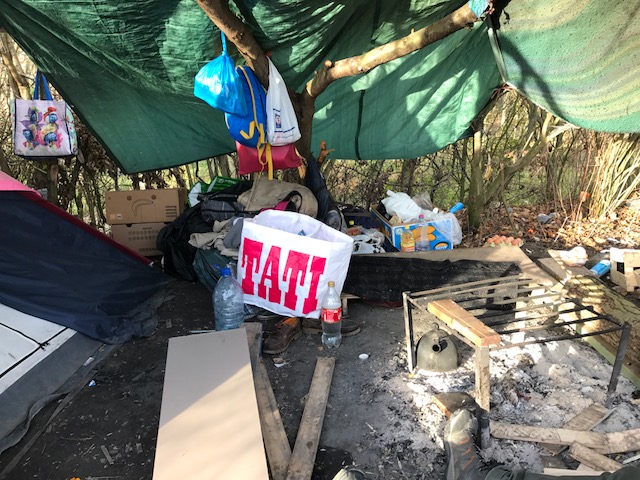 By Julia Bard, Jewish Socialists’ Group. You can see Julia’s blog here.
By Julia Bard, Jewish Socialists’ Group. You can see Julia’s blog here.
Two of us from the Jewish Socialists’ Group were part of a convoy of 120 from across the country, going to Calais to deliver supplies to refugees who are trapped there, trying to get to Britain. Their camps have been destroyed, so they are hiding in woods and sleeping rough. Every few days the French police take their few belongings – clothes, sleeping bags, food, tents, tarpaulins – which they need to survive. Today it is freezing but at least it’s dry.
People often refer to the Kindertransport as an example of British generosity in welcoming refugees. In fact it epitomises the meanness of the government of the day, which allowed a few thousand children to escape from Nazi persecution on the Continent. The whole operation – from identifying the children, arranging and paying for their journeys, finding families to care for them or other safe places to stay – was organised by voluntary groups like this one going to Calais today. It didn’t cost the British state a penny. And the government only allowed children to come to Britain. Their parents were left to the mercy of the Nazis. And throughout that period, in 1938-39, the mainstream press were running scare stories about being swamped with foreigners.On the coach on the way there, a few of the participants, who ranged from school students to older activists like me, made short, off-the-cuff speeches. This is (approximately) what I said:
This attitude to refugees was not a one-off. It is part of a consistent tradition of government hostility to immigrants. The very first anti-immigration legislation was the 1905 Aliens Act. That law was enacted against Jews who were escaping persecution in the Russian Empire. Those people included our grandparents. The Aliens Act established all the principles of British immigration law that are familiar to us today, including the powers to deport people. In the first four years of the Act, hundreds of people were rounded up off the streets and deported back to the Russian Empire, simply for having no visible means of support.

The “kitchen” rigged up by a family with two children, aged 7 and 10, who are living in this makeshift shelter with no facilities of any kind except what is provided by organisations like Care 4 Calais and Médecins Sans Frontières
Like everyone here who got up in the dark this morning in freezing temperatures, we’re all wondering how on earth people survive physically and psychologically living in these conditions 24 hours a day. David and I from the JSG have just come back from a trip to Auschwitz organised by Unite Against Fascism. I wouldn’t make crass analogies between that death camp and what’s happening today. But Auschwitz didn’t happen overnight. It was the culmination of creeping authoritarianism that ended with the terrorisation of entire populations who were unable to stop murder on an industrial scale.
Resistance takes lots of forms, and people resisted in many different ways. Sometimes, just surviving the day was an act of resistance. Taking supplies to Calais today, refusing to accept the violence of our government and all the governments of Europe against these people, is also an act of resistance, and I’m very pleased to be part of it.
Care4Calais are doing the most amazing thing there, saving lives and giving support and hope to people who have nothing and no choices. If you want to know more about what they’re doing and how to support them, visit their website at http://care4calais.org/
This trip was jointly organised by Care4Calais and Stand Up to Racism. Thanks to both for everything you’re doing.
